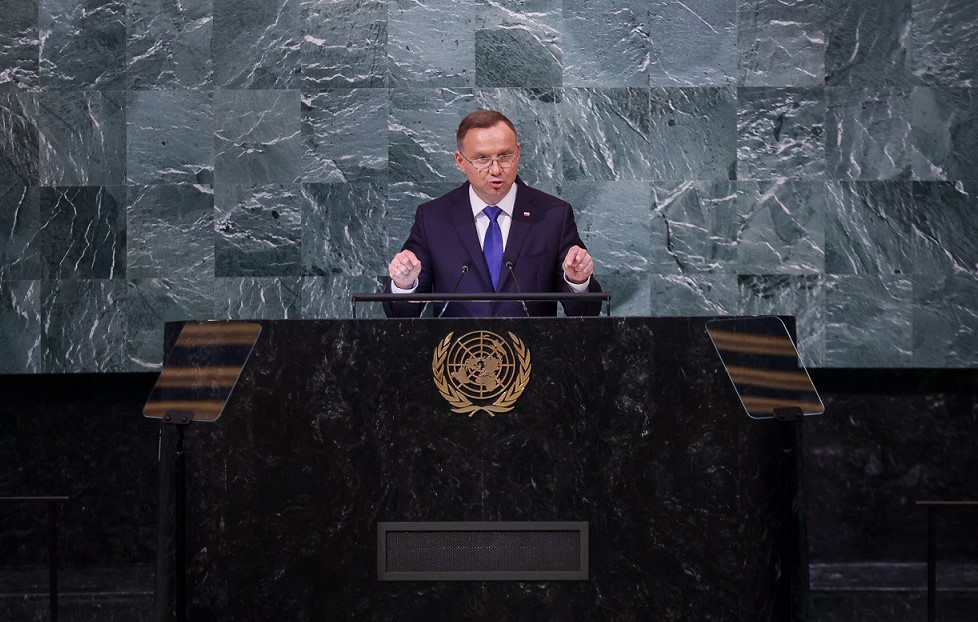Polish President Andrzej Duda has warned the UN General Assembly against treating Russia’s war in Ukraine as simply a regional conflict. In his opinion, it could become the flashpoint for a “global conflagration”.
He also called on the international community to do more to tackle the food crisis caused by the war and to hold Russia accountable for its violations of international law, including ensuring that it pays war reparations to Ukraine.
“A year ago, I was speaking here as president of a country of 38 million people. Today, I stand on this stage aware that more than 40 or even 41 million people are currently living in my country Poland,” he said, referring to the massive influx of refugees from Ukraine.
Rosja już przegrała tę wojnę – mówił Andrzej Duda w ONZ. Zaapelował o pociągnięcie Moskwy do odpowiedzialności za zbrodnie na #Ukraina.
Russia has already lost this war, says Polish president at #UNGA. Andrzej Duda called for bringing Russia to justice for war crimes in Ukraine. pic.twitter.com/IAX8y4znHP
— Wojciech Cegielski (Polskie Radio / Podcast Świat) (@wojciechce) September 21, 2022
“This is not just a regional conflict. Russia’s war against Ukraine is a potential source of a global conflagration. This war will affect our countries as well as yours, if it hasn’t already,” he said during Tuesday’s general debate of the 77th session of the UN General Assembly in New York.
Duda noted that one of the worst global consequences of Russian aggression is the food crisis and resultant risk of famine that looms over many countries.
Before the war, Russia and Ukraine together exported nearly a third of the world’s wheat and barley and more than 70% of its sunflower oil. Some countries, such as Moldova or Lebanon, imported nearly all of their wheat from Ukraine.
“From the very beginning of the invasion, Russia has been deliberately and cynically destroying crops and agricultural machinery, and the invasion itself has radically reduced Ukrainian harvests,” he said. “Russia has seized farmland representing 22% of all agricultural land in Ukraine.”
“Land on which nearly 30% of the world’s winter grain potential is grown has suddenly failed to yield this season or its crops have been plundered,” he added. “Who will suffer from this? Those most in need. It is an economic weapon, it is a food weapon targeting Africa and the Middle East in particular.”
“Because of the war in Ukraine, it is estimated that the number of people suffering from chronic hunger will increase by some 47 million people worldwide this year,” continued Duda.
Famine planning https://t.co/XWstcdpk9s
— Anne Applebaum (@anneapplebaum) May 5, 2022
“I have been in politics long enough to have no doubt about it: this is Russia’s deliberate policy,” said the Polish president, who declared that “the international community is obliged not to allow anyone to deliberately and cynically introduce – as Stalin did in the 1930s – artificial famine in the name of achieving his political goals”.
Duda said that Poland, as a neighbour of Ukraine, together with its EU partners is committed to facilitating the export of Ukrainian grain by land “to ensure that it reaches those in need, particularly in Africa, Asia, South America and wherever it is needed for people to survive”.
To facilitate grain transport Poland has launched five additional access points for trucks on the border with Ukraine this year in order to double the cargo traffic capacity between the two countries.
Duda also warned that the world must hold Russia accountable for its violations of international law. If not, then, while “today Ukraine is the victim, tomorrow it can be any country in the world”.
“Poland will not stop its efforts to bring Russia to justice for violations of international law,” he declared. These efforts should include Russia paying reparations for the damage it has caused in Ukraine, because “there is no justice without compensation”.
Since Russia’s invasion of Ukraine, Poland has been one of Kyiv’s strongest allies, providing more military equipment than any country other than the US, lobbying for tougher sanctions on Russia, and continuing to host more than a million Ukrainian refugees.
Main image credit: Jakub Szymczyk/KPRP

Alicja Ptak is deputy editor-in-chief of Notes from Poland and a multimedia journalist. She has written for Clean Energy Wire and The Times, and she hosts her own podcast, The Warsaw Wire, on Poland’s economy and energy sector. She previously worked for Reuters.




















